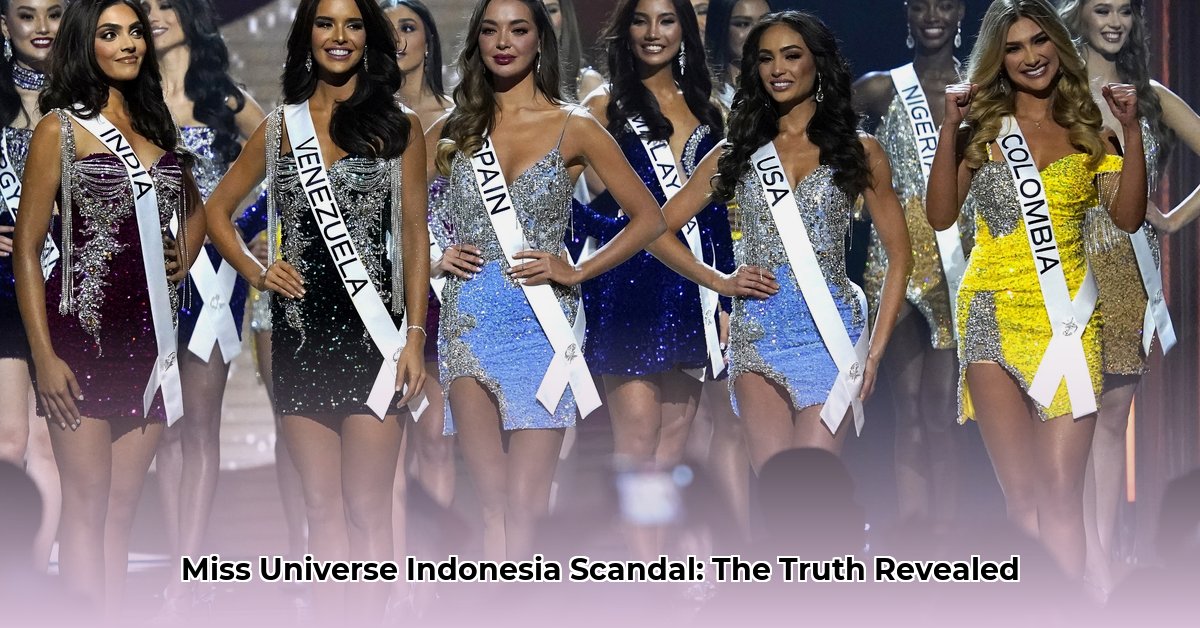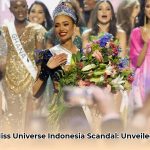The Miss Universe Indonesia 2023 pageant, intended to celebrate beauty and empowerment, instead became marred by scandal. While Fabiënne Nicole Groeneveld was crowned the winner, the event is now largely remembered for serious allegations of sexual harassment, ultimately leading to the termination of the national franchise. This article delves into the unfolding events, the reactions they provoked, and the crucial reforms needed to safeguard future contestants and restore faith in the integrity of beauty pageants.
The “Body Check” Scandal: Allegations of Sexual Harassment Emerge
The inaugural Miss Universe Indonesia pageant was quickly overshadowed by disturbing allegations from multiple contestants. These women bravely came forward with claims of experiencing sexual harassment during what was described as a “body check,” sparking public outrage and igniting a global conversation about ethical conduct and consent within the beauty pageant industry.
Details of the Allegations and Their Impact
The contestants’ accounts painted a picture of invasive and deeply humiliating experiences during the “body check.” The allegations included being instructed to strip down to their underwear in cramped rooms, some of which allegedly had men present. Contestants reported feeling pressured to pose in ways that made them uncomfortable, and some alleged unwanted touching. These revelations triggered widespread media scrutiny and a fierce public demand for transparency and accountability from pageant organizers. Legal experts weighed in, highlighting the potential lack of clear guidelines and oversight regarding physical examinations as a major contributing factor to the alleged abuses. The incidents brought to light the inherent power imbalances that can exist between contestants, who are often young and vulnerable, and the organizers who hold significant authority.
Height Controversy and the Problematic Focus on Physical Standards
Further fueling the controversy, initial height requirements sparked intense debate, exposing inconsistencies and raising questions about unfair standards within the competition. Critics argued that an excessive focus on physical attributes detracted from contestants’ talents, intelligence, and overall character. The controversy amplified long-standing concerns about arbitrary constraints and subjective judgment within the world of beauty pageants and prompted a broader discussion about the need to prioritize holistic attributes over superficial qualities.
Calls for Inclusivity and Equitable Practices
The height requirement controversy served as a stark reminder of the need for more inclusive and equitable practices within the pageant industry. Many argued that an overemphasis on narrow physical ideals excludes a wide range of potentially talented and inspiring participants. Discussions centered on the adoption of more holistic judging criteria that would evaluate contestants based on their personality, accomplishments, and potential to make a positive impact on the world, rather than solely on their adherence to outdated beauty standards.
Miss Universe Organization Responds: Termination of the Indonesian Franchise
In response to the gravity of the allegations, the Miss Universe Organization (MUO) made the decisive move to terminate its franchise agreement with the Indonesian licensee, Poppy Capella. This action underscored the seriousness with which the MUO viewed the allegations and signaled a commitment to upholding ethical standards. While the MUO condemned the alleged actions, many observers felt that stronger and more proactive measures were needed to prevent similar incidents from occurring in the future. The situation raised critical questions about what long-term safeguards could be implemented to guarantee contestant safety and well-being across all Miss Universe franchises worldwide.
Reforms and Solutions: A Path Forward
The termination of the Indonesian franchise served as a wake-up call and illuminated several critical needs for reform within the pageant industry:
- Robust Safety Protocols: Clear and comprehensive guidelines are essential to protect contestants from all forms of harassment and exploitation. These protocols must include accessible and confidential reporting mechanisms and swift and impartial investigations of any allegations.
- Improved Transparency: Greater transparency in all aspects of pageant operations is crucial for building trust and fostering a culture of accountability. This includes clear communication of rules, judging criteria, and grievance procedures.
- Ethical Guidelines and Training: Comprehensive training programs for all staff, organizers, judges, and contestants are needed to emphasize ethical conduct, consent, and the creation of a safe and respectful environment.
- Independent Oversight: Establishing an independent body to monitor pageant operations and ensure adherence to ethical standards can provide an additional layer of protection for contestants and help to prevent abuses of power.
These recommendations highlight the urgent need for systemic change to create a safe, respectful, and equitable environment for all participants in beauty pageants, while also ensuring fairness, transparency, and accountability at all levels.
Recommendations for Key Stakeholders: Fostering Ethical Standards
Meaningful and lasting change requires a collaborative effort from all stakeholders within the pageant industry, working together to create a safer and more ethical environment for contestants.
| Stakeholder Group | Recommended Actions |
|---|---|
| Miss Universe Organization | Strengthen international standards and establish a global ethics committee with the power to investigate and sanction misconduct. Implement mandatory, comprehensive training on ethics, consent, and bystander intervention for all organizers, staff, and judges worldwide. Develop and enforce stricter penalties for misconduct, including potential franchise revocation. |
| Future Franchise Holders | Prioritize contestant well-being above all else, creating a supportive and empowering environment. Establish independent ethics committees and clear reporting mechanisms for contestants to voice concerns without fear of reprisal. Implement thorough background checks of all personnel involved in the pageant, including organizers, staff, judges, and sponsors. |
| Indonesian Pageant Industry | Collaborate to create industry-wide ethical standards and establish an independent regulatory body to oversee pageant operations and ensure compliance with ethical guidelines. Promote transparency and accountability measures, including public disclosure of judging criteria and financial information. Implement robust consent and safety protocols for all contestants. |
| Contestants | Encourage open communication and create peer support networks for contestants to share experiences and report issues safely and confidentially. Promote a culture of mutual respect and accountability among contestants, discouraging internal competition and fostering a sense of solidarity. |
The Fallout: Impact on Finalists and the Wider Pageant Community
The Miss Universe Indonesia 2023 pageant has become a flashpoint for broader discussions about power dynamics, exploitation, and the critical importance of consent within the modeling and entertainment industries. The allegations of sexual harassment have had a profound impact on the young women who competed in the pageant, leaving many with emotional scars and raising questions about the responsibility of the industry to protect its participants.
Ripple Effect of the Allegations and Their Consequences
The allegations, particularly those involving the topless “body checks,” triggered widespread outrage and prompted formal police investigations. Contestants involved in the scandal have faced significant emotional distress, public scrutiny, and the burden of navigating complex legal proceedings. The pressure they have faced has been immense, and the experience has undoubtedly left a lasting mark. The situation underscores the urgent need for stronger safeguards to protect contestants from exploitation and abuse in the future.
Practical Steps for Prevention: Ensuring Long-Term Solutions
Implementing sustainable change requires concrete actions to protect contestants and prevent future incidents of harassment and exploitation. The following recommendations can serve as a starting point:
- Develop Comprehensive Safety Protocols: Implement clear and detailed guidelines on appropriate conduct during all aspects of the pageant, with guaranteed confidentiality for reporting violations.
- Establish Independent Oversight Committees: Create independent committees with the authority to monitor pageant operations, investigate allegations of misconduct, and enforce ethical standards.
- Mandate Comprehensive Training: Require all individuals involved in the pageant, including organizers, staff, judges, and contestants, to undergo mandatory training on preventing sexual harassment, promoting ethical conduct, and ensuring contestant safety.
- Re-evaluate Judging Criteria: Shift the focus of judging from purely physical appearance to factors such as talent, intelligence, personality, and commitment to social causes, reducing the incentive for exploitation based on physical attributes.
- Embrace Transparency and Accountability: Openly address concerns, investigate allegations thoroughly, and hold individuals accountable for their actions, fostering a culture of transparency and ethical behavior.
The pageant industry must embrace meaningful and systemic change to ensure the safety, dignity, and well-being of every contestant. The future of beauty pageants depends on it.
Reflections: The Inaugural Pageant and a Call for Change
While Fabiënne Nicole Groeneveld’s victory should have been a moment of celebration, the Miss Universe Indonesia 2023 pageant will likely be remembered more for the controversy and the lessons learned. A healthier and more ethical pageant industry requires a collective commitment to change, ensuring that contestant safety and well-being take absolute priority. Further research, ongoing dialogue, and a willingness to challenge the status quo are vital for long-term improvement and for restoring public trust in the integrity of beauty pageants.














